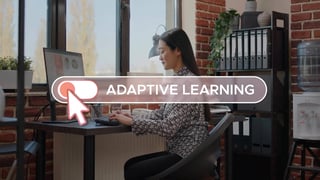The Rise Up blog
Everything you need to know about best practices in vocational training
-
11 Minutes of reading
Published on 07 June 2022.

Developing a learning culture, providing accessible training for employees and improving learner engagement are just some of the challenges companies face when it comes to upskilling their workforce.
-
6 Minutes of reading
Published on 14 May 2022.

This was the title of a recent webinar on adaptive learning, conducted by Rise Up in conjunction with HR analysts Fosway Group. Michael Strawbridge, global head of community at the Learning and Performance Institute, chaired the webinar, with Marie Redor, head of product at Rise Up and Fiona Leteney, senior analyst at Fosway Group, forming the panel.
-
7 Minutes of reading
Published on 14 May 2022.

The pandemic and its consequences – travel restrictions, lockdowns and the shift to remote working – have led to the exponential digitalisation of work and professional training. Beyond that, the pandemic has led to a paradigm shift, forcing us to take a step back and reflect on how we run our economies and societies. As a result, we have come to realise the importance of human connections.
-
9 Minutes of reading
Published on 14 May 2022.

The Covid-19 pandemic has been completely unprecedented, meaning that we’ve had no points of reference to help us make sense of what has unfolded. Many sectors, such as retail and hospitality, struggled during the successive lockdowns in the UK and had to either make their employees redundant or put them on furlough. And as the pandemic has dragged on, the wider economy has taken a hit, with many companies being forced to shut down completely.
-
9 Minutes of reading
Published on 14 May 2022.

Ever wondered what skills training managers will need in the future? We heard from Stéphane Diebold, head of the training association AFFEN, during a conference held at the SRH E-learning Expo. Having worked as an executive within dozens of companies, Stéphane established AFFEN, which he describes as the first think tank and “do tank” for training managers. Passionate about all things training, he touched on some key skills that trainers will need to remain relevant in the future. Rise Up was there. Here are some of our key takeaways from the session.
-
7 Minutes of reading
Published on 14 May 2022.

It’s clear that the pandemic and the resulting lockdowns have accelerated the digitalisation of training. In no time at all, professional training methods have been completely transformed. Delivering traditional in-person training has been made much more difficult. Companies are being forced to look towards digital learning methods, based on e-learning or blended learning.
-
6 Minutes of reading
Published on 14 May 2022.

Do you find millennials a difficult generation to train? We’ll provide you with some key pointers for how to engage them, including working in groups, freedom of expression, visual communication and learning by experience.
-
6 Minutes of reading
Published on 13 May 2022.

The world of work is set to undergo a global reskilling revolution. That’s according to analysis conducted by the World Economic Forum, which has claimed that almost one third of all jobs worldwide will be transformed by technology in 2030. As jobs evolve, so will the skills required to perform them. Reskilling workforces will therefore be crucial to ensure that employees have the skills they need to perform the jobs of the future and fulfil their potential.
-
9 Minutes of reading
Published on 13 May 2022.

According to a report published by the ONS, there were a record 1.2 million job vacancies in the three months to November 2021 in the UK, with businesses struggling to fill posts. The main reasons for this were a low number of applications and a lack of qualified applicants – indicating an economy-wide, national skills shortage.
-
8 Minutes of reading
Published on 12 May 2022.

Have you ever struggled to find the right person for a role, no matter how hard you tried to advertise the job and provide a generous rewards package? You’re not alone. According to a report published by the Open University, more than two-thirds of employers have struggled to recruit workers with the right skills. And this skills gap costs organisations an eye-watering £4.4 billion in recruitment fees, temporary staffing and increased salaries.

